Foreign Aid
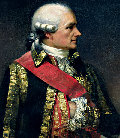
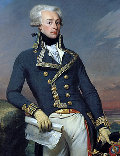
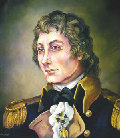
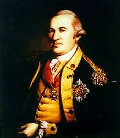
Thaddeus Kosciusko was born in Poland February 4, 1746. He attended school in Lubieszow & then the Cadet Academy in Warsaw where he studied engineering. He continued his studies in Paris where he met Ben Franklin. Franklin convinced him to join the Revolution so, in 1776, Thaddeus went to Philadelphia to lend his talents to the cause. Upon his arrival he read the Declaration of Independence & was moved to tears because it contained everything that he believed. He became determined to meet its author & he & Jefferson became life long friends. During the war, Kosciusko's talents as an engineer proved invaluable. He assisted in the fortification of the Philadelphia waterfront at Ft. Mercer, helped with the fortifying of the Hudson & planned the defense of Saratoga. In 1778 Kosciusko was made Chief Engineer of West Point. In 1783 he was appointed Brigadier General & was awarded the Cincinnati Order Medal by George Washington himself. Washington also presented Kosciusko with two pistols & a sword as gifts for his outstanding service to America. Of Kosciusko Jefferson wrote, "He is as pure a son of liberty as I have ever known."
Born in Magdeburg & schooled by Jesuits, Baron Frederick Wilhelm Augustus von Steuben was an officer in the Prussian military by the age of 16 & was eventually assigned to the general staff at the HQ of Frederick the Great. With the end of the Seven Years' War, von Steuben traveled around & ended up in Paris where he met Ben Franklin. In need of a job, von Steuben went to America arriving at Portsmouth, NH in 1777 with a letter of recommendation from Ben Franklin in hand. His first assignment was at Valley Forge. His task was to turn an undisciplined, poorly supplied group of civilians into a fighting unit capable of facing the British Army. He trained the men in drills, rapid fire & the use of the bayonet. His style of discipline was harsh & abrasive. He would constantly curse at the men but, speaking little english,he enlisted his aide to curse at the men for him. His training proved effective at the Battle of Monmouth where the Americans stood their ground causing the British to retreat. At the Battle of Stoney Point, the Americans attacked with unloaded muskets & won the battle solely on von Steuben's bayonet training. He also instituted a program of camp sanitation & authored the first military training manual.
The Marquis de Lafayette was a French military officer who participated in "thinking groups" where French involvement in the American Revolution was discussed. In these think tanks & secret Masonic lodges, Lafayette & others discussed the rights of man, & criticized nobility, the clergy & slavery. After refusing to toast King George, Lafayette went to America in 1776 & was made a major general & was appointed as Washington's aide-de-camp. At Brandywine, though wounded & overrun, Lafayette managed an organized retreat. He was cited for bravery & military ardour & given his own command. He proved instrumental at the battles of Monmouth & Yorktown & in the procurement of French support. The Oneida Indian tribe refferred to him as "Fearsome Horseman."
The Comte de Rochambeau was the commander of the land forces as part of the French mission codenamed Expedition Particuliere. He arrived at Newport, RI in July 1780. In 1781 his force of 5,000 troops joined with Washington in New York. The combined forces marched the 'celebrated march' to Virginia for the siege of Yorktown & the Battle of the Chesapeake. On September 22nd they combined with Lafayette's troops & forced the surrender of Cornwallis. He returned to France & commanded the military of France between the fall of Louis the XVI in 1792 & the rise of the first French Empire under Napoleon Bonaparte in 1804. He was arrested during the Reign of Terror & narrowly escaped the guillotine.
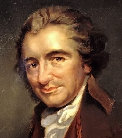
Though not involved in combat, journalist Thomas Paine was as much responsible for the success of the revolution as any soldier. Born in Thetford, England he emigrated to America in 1774. In 1776 he authored the widely popular pamphlet 'Common Sense.' Writing & reasoning in a style the common man could understand, Paine outlined the case for independence at a time when the issue was still a matter of some debate. Part of his series of inspirational pro-revolutionary pamphlets, 'American Crisis' was read by Washington to his men in the winter of 1776, motivating them to cross the Delaware & attack the Hessians at Trenton. John Adams rightfully noted that, "Without the pen of [Thomas Paine], the sword of Washington would have been raised in vain."
Click image to enlarge




